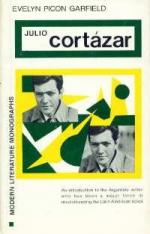|
This section contains 1,426 words (approx. 5 pages at 300 words per page) |

|
Cortázar wholeheartedly continues, in his own fashion, surrealism's vast dream of undoing the whole rational machinery and routine of Western thought and regaining man's true spiritual abode. At the outset of [Hopscotch] there are … two parallel texts of moral prescription, one in academic eighteenth-century Castilian, the other in mock-illiterate Argentine slang: Cortázar has a uniquely sensitive ear for his countrymen's living speech, which he humorously stylizes and plays off against abstractions in an effort to demolish clichés, rhetoric, jargon. These contrasting epigraphs suggest further the principle of juxtaposition which dominates the novel's structure (a loose mixture of philosophy and parody) and its most experimental feature: the combinational rearrangement of its parts. Like the French anti-novelists, Cortázar wants to involve his readers creatively in that rearrangement so as to renew fiction as an instrument of perception. He differs from these writers, however, in his attempt...
|
This section contains 1,426 words (approx. 5 pages at 300 words per page) |

|


